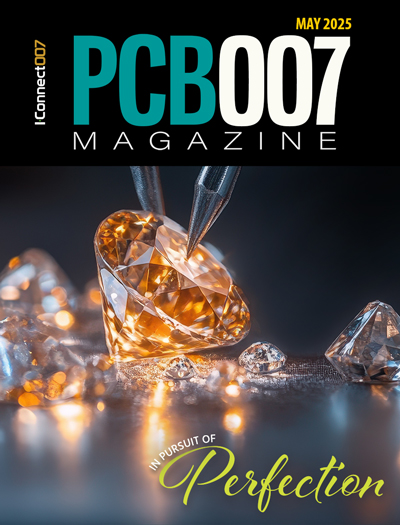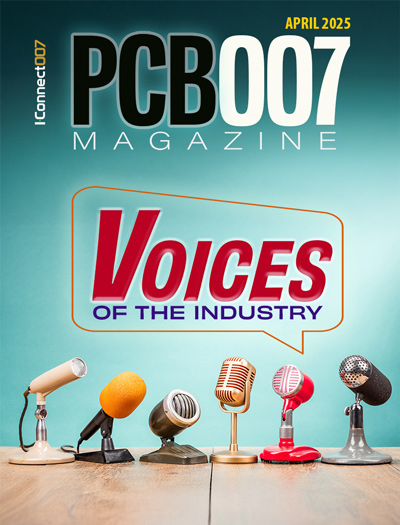-

-
News
News Highlights
- Books
Featured Books
- pcb007 Magazine
Latest Issues
Current Issue
The Hole Truth: Via Integrity in an HDI World
From the drilled hole to registration across multiple sequential lamination cycles, to the quality of your copper plating, via reliability in an HDI world is becoming an ever-greater challenge. This month we look at “The Hole Truth,” from creating the “perfect” via to how you can assure via quality and reliability, the first time, every time.

In Pursuit of Perfection: Defect Reduction
For bare PCB board fabrication, defect reduction is a critical aspect of a company's bottom line profitability. In this issue, we examine how imaging, etching, and plating processes can provide information and insight into reducing defects and increasing yields.

Voices of the Industry
We take the pulse of the PCB industry by sharing insights from leading fabricators and suppliers in this month's issue. We've gathered their thoughts on the new U.S. administration, spending, the war in Ukraine, and their most pressing needs. It’s an eye-opening and enlightening look behind the curtain.
- Articles
- Columns
- Links
- Media kit
||| MENU - pcb007 Magazine
MKS’ Atotech and ESI to Participate at TPCA Show & IMPACT Conference 2024
October 23, 2024 | MKS Instruments, Inc.Estimated reading time: 4 minutes
MKS Instruments, Inc., a global provider of enabling technologies that transform our world, announced that its strategic brands ESI (laser systems) and Atotech (process chemicals, equipment, software, and services) will showcase their latest range of leading manufacturing solutions for printed circuit board (PCB) and package substrate manufacturing at the upcoming 25th Taiwan Circuit Board Industry International Exhibition 2024 to be held at the Taipei Nangang Exhibition Center from 23-25 October 2024.
Combining leading capabilities in lasers, optics, motion, process chemistry, and equipment, MKS is uniquely positioned to Optimize the InterconnectSM, a key enabler for the next generation of advanced electronics, which represents the next frontier in miniaturization and complexity. The Optimize the InterconnectSM approach demonstrates the company’s unique position to support the development of next-generation advanced PCB and package substrate manufacturing solutions for its customers and partners. “Our commitment to APAC is more than strategic, it is fundamental to our future. We are partnering with key manufacturers and supporting new technologies and ever smaller feature sizes by combining MKS’ ESI laser drilling technologies with MKS’ Atotech chemistry and plating equipment,” said Jim Schreiner, EVP and COO, MSD.”
The company has recently installed the latest equipment and process technology at its local APAC technology centers to drive the production of next generation package substrates and offer customers and OEMs faster development cycles for new products and materials, enabling high-end SAP technology requiring <=5/5µm lines and spaces.
Another example of progress comes from applications such as flex, advanced HDI or substrate-like PCBs. MKS can offer customers a comprehensive combination of optimized laser drilling, plating and surface modification chemistries and manufacturing equipment. Customers benefit from our unique one-stop-shop destination for pre-treatment, via formation, plating, and final finishing with fast turnaround times that don’t require production interruption, enabling our customers to achieve better yields, productivity, and performance. For substrate-like PCBs, MKS’ Atotech and ESI are currently working together with the industry to enable the next generation of mSAP technology and to introduce more sustainable solutions to comply with CO2 footprint reduction roadmaps, said Harald Ahnert, VP and GM Chemistry, MSD.
Wayne Cole, Senior VP, Global Sales and Service, adds, “As technology advances, semiconductors, package substrates and printed circuit boards continue to play a key role in driving innovation across multiple industries. These components are essential for powering next generation communication networks, enabling high-performance computing, supporting electrification in vehicles and advancements in driver assistance systems to pave the way towards sustainable transportation. These technologies are the foundation for a more connected and sustainable future. We are committed to meeting the evolving needs of our customers by delivering cutting-edge solutions that push the boundaries of electronics design. Experts from both brands will be available and ready to discuss latest industry trends and challenges at the TPCA Show booth K-915 on the 1st floor of the Nangang Exhibition Hall 1”.
On the chemistry side, highlights in surface treatment include EcoFlash® S300, a new differential etch solution suitable for advanced package substrates and , our new high-tech inner-layer adhesion promoter for high-speed AI applications. For metallization, our highlights include Printoganth® MV TP2, a high performance electroless copper process specifically designed for SAP fine line applications, and our even more enhanced Printoganth® MV TP3 process, which enables ultra-thin Cu deposition for fine lines down to 2/2 µm L/S, ideally combined with Cupraganth® MV, our new and revolutionary copper-based activation system. For electrolytic copper plating, we highlight our new reverse pulse plating solution for inclusion-free, high aspect ratio through hole filling of package substrate cores, Inpulse® 2THF2, and our production-proven InPro® SAP3 process for BMV filling with best surface distribution at high current densities. For conformal high hole density package substrate core plating we are promoting Cuprapulse® XP7-IN, our new solution for excellent plating uniformity.
For final finishing highlights range from the OSP solution OS-Tech® SIT 2, the new Aurotech® G-Bond 3 versatile gold bath for nickel/gold, nickel/palladium/gold and palladium/gold plating to Stannatech® for flex PCBs, as well as for thick tin plating of µ-LEDs or solder depot plating and Stannatech® IC for package substrates.
PCB equipment systems promotions include G-Plate®, a new HVM tool for PTH processes of next generation package substrates enabling highest yields and cutting-edge fine line capability targeting L/S <5/5 µm, vPlate®, a new vertical continuous plating tool for advanced HDI and package substrate for best-in-class surface uniformity. And last not least the new Uniplate®, the company’s flagship HVM system and industry-leading horizontal plating equipment for next-generation HDI PCBs and package substrate manufacturing.
Laser equipment promotions include the latest Capstone™, a high-performance/throughput breakthrough productivity for flex PCB UV drilling and Geode™ (CO2 and UV laser for HDI and package substrate applications). A special show highlight Geode™ A our new CO2 laser system for high precision and high-speed ABF build-up laminate processing. Geode™ G2 our new CO2 laser system for high-precision and high-speed HDI and mSAP via drilling. The Geode™ platform provides 15% higher optical transmission, 21% less total service area and up to 65% lower power consumption.
Suggested Items
Knocking Down the Bone Pile: Tin Whisker Mitigation in Aerospace Applications, Part 3
06/25/2025 | Nash Bell -- Column: Knocking Down the Bone PileTin whiskers are slender, hair-like metallic growths that can develop on the surface of tin-plated electronic components. Typically measuring a few micrometers in diameter and growing several millimeters in length, they form through an electrochemical process influenced by environmental factors such as temperature variations, mechanical or compressive stress, and the aging of solder alloys.
Day 1: Cutting Edge Insights at the EIPC Summer Conference
06/17/2025 | Pete Starkey, I-Connect007The European Institute for the PCB Community (EIPC) Summer Conference took place this year in Edinburgh, Scotland, June 3-4. This is the second of three articles on the conference. The other two cover the keynote speeches and Day 2 of the technical conference. Below is a recap of the first day’s sessions.
Advint Delivers Advanced Electroplating Training to Triangle Labs
06/02/2025 | Advint IncorporatedDuring the last week of April, Advint Incorporated conducted a comprehensive two-day on-site electroplating training session for the technical team at Triangle Labs, Inc., a key innovator in the printed circuit board space. The training was structured to align with the demands of high-reliability plating processes suitable for RF and high-frequency substrates.
MKS Breaks Ground on New Chemical Manufacturing and TechCenter Facility in Thailand
05/07/2025 | MKS Instruments, Inc.MKS Instruments. Inc., a global provider of enabling technologies that transform our world, announced today the groundbreaking of its cutting-edge Atotech chemical manufacturing and TechCenter facility at the Asia Industrial Estate Suvarnabhumi, located east of Bangkok, Thailand.
Elephantech: For a Greener Tomorrow
04/16/2025 | Marcy LaRont, PCB007 MagazineNobuhiko Okamoto is the global sales and marketing manager for Elephantech Inc., a Japanese startup with a vision to make electronics more sustainable. The company is developing a metal inkjet technology that can print directly on the substrate and then give it a copper thickness by plating. In this interview, he discusses this novel technology's environmental advantages, as well as its potential benefits for the PCB manufacturing and semiconductor packaging segments.


